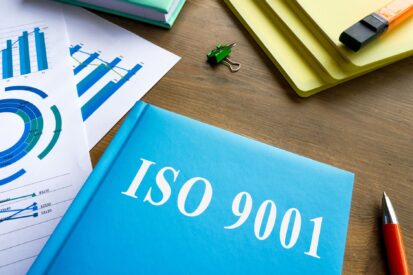In today’s globalised economy, supply chain security has become a growing concern for businesses across various industries, including those operating in Australia. The increased reliance on external partners, suppliers, and vendors exposes organisations to significant risks, as any security gaps in the supply chain can put sensitive data, operational processes, and overall business continuity at risk. With cyber threats and supply chain disruptions on the rise, implementing a comprehensive approach to supply chain security is more crucial than ever.
One powerful tool that businesses can employ to strengthen their supply chain security is the ISO 27001 framework. This internationally recognised standard provides guidelines for establishing, implementing, and maintaining a robust Information Security Management System (ISMS) that extends beyond the organisation itself, incorporating third-party relationships and ensuring holistic protection across the business environment.
In this blog article, we will explore the importance of supply chain security for Australian businesses, discussing the role of the ISO 27001 framework in creating a comprehensive and resilient security strategy. By digging into the key benefits and practical steps for integrating ISO 27001 principles into supply chain risk management, this piece will empower businesses to better navigate the complex security landscape, fostering trust and ensuring business continuity in the face of evolving challenges.
1. The Significance of Supply Chain Security in Australia
As Australia continues to strengthen its position within the global economy, supply chain security gains vital importance in ensuring the protection of sensitive information, intellectual property, and operational integrity. Some key factors driving the need for robust supply chain security include:
– Globalisation: Australian businesses are increasingly reliant on a wide range of global suppliers and service providers, amplifying the potential for security risks to propagate throughout the supply chain.
– Cyber Threat Landscape: Cyber-attacks on supply chain elements, such as third-party logistics providers and software suppliers, can cause significant disruption and expose sensitive information to malicious actors.
– Compliance Requirements: As regulatory frameworks around data privacy and information security evolve, Australian businesses must ensure their supply chain partners adhere to relevant standards and requirements.
– Business Continuity: A secure and reliable supply chain is essential for maintaining organisational resilience, safeguarding operations and financial performance against potential disruptions.
2. ISO 27001: An Ally in Supply Chain Security Management
The ISO 27001 framework offers a robust and systematic approach to managing information security risks, including those associated with supply chain relationships. By incorporating ISO 27001 principles into supply chain security strategies, Australian businesses can:
– Implement a Comprehensive Security Approach: The ISO 27001 standard provides a holistic and risk-based methodology to assess and manage information security risks that encompass the entire supply chain ecosystem.
– Foster Consistent Standards: Aligning supply chain security practices with the ISO 27001 framework ensures that all parties adhere to a consistent set of security standards, minimising the potential for security gaps or inconsistencies.
– Enable Visibility and Accountability: The transparency and accountability provided by the ISO 27001 ISMS enable businesses to effectively oversee and manage their supply chain relationships and potential security risks.
– Encourage Continuous Improvement: ISO 27001 promotes a commitment to ongoing security improvement and risk reassessment, ensuring supply chain security practices adapt to new threats and changes within the business environment.
3. Steps to Implement an ISO 27001-aligned Supply Chain Security Strategy
By integrating the ISO 27001 framework into their supply chain security approach, Australian businesses can better manage potential risks and ensure the resilience of their operations. The following steps offer guidance on achieving this integration:
- Conduct Supply Chain Risk Assessments: Utilise the ISO 27001 risk assessment methodology to identify and evaluate potential threats and vulnerabilities within your supply chain. Prioritise risks based on likelihood and potential impact and establish relevant controls.
- Define Security Requirements for Suppliers: Clearly specify the necessary security requirements and expectations for suppliers and partners, aligned with the ISO 27001 controls. Ensure these requirements are incorporated into contractual agreements with third parties.
- Develop Supplier Management Processes: Establish a defined process for selecting, auditing, and monitoring the security performance of supply chain partners. Ensure consistent adherence to the ISO 27001 framework and continuous improvement in security practices.
- Educate and Train Staff: Provide ongoing security awareness training to both internal staff and supply chain partners, enabling them to understand and manage security risks effectively and in alignment with the ISO 27001 framework.
- Foster Collaboration: Encourage open dialogue and collaboration between your organisation and supply chain partners regarding security risks, incidents, best practices, and shared responsibilities.
4. Benefits of Adopting an ISO 27001-aligned Supply Chain Security Strategy
Australian businesses leveraging the ISO 27001 framework to strengthen their supply chain security can expect several benefits, including:
– Enhanced Security Posture: Implementing a comprehensive supply chain security strategy incorporating ISO 27001 principles promotes a more resilient information security posture, mitigating potential disruptions and data breaches.
– Regulatory Compliance: Aligning supply chain security practices with the ISO 27001 framework demonstrates compliance with international best practices and supports adherence to data privacy regulations and industry-specific standards.
– Improved Business Resilience: A secure supply chain contributes to organisational resilience, ensuring minimal disruptions and swift recovery in the face of unexpected incidents.
– Competitive Advantage: Robust supply chain security and adherence to the ISO 27001 standard can distinguish your business in the eyes of potential customers, collaborators and stakeholders who value strong security measures and resilience.
Harnessing the Power of ISO 27001 for Supply Chain Security
As supply chain security grows in importance within the Australian business landscape, organisations must leverage powerful tools like the ISO 27001 framework to address evolving risks and secure their operations. By adopting a comprehensive, risk-based approach and working closely with supply chain partners, Australian businesses can bolster their security posture, ensure business continuity and build lasting success in an increasingly connected world.
For tailored guidance on implementing an ISO 27001-aligned supply chain security strategy, consider partnering with experienced ISO 9001 Consultants today. Our ISO certification experts can support your organisation in developing, implementing, and maintaining an effective and resilient security strategy, future-proofing your supply chain against evolving threats and challenges.








Users Comments
Get a
Quote